Come, this is also your home!
Interviewees/Cai Weixin, You Peishan
Photo courtesy/Kaohsiung Indonesian Friends Association
Exclusive interview with Kaohsiung Friends of Indonesia Caring for Migrant Workers Action
This is a place where people from different regions, different ethnic groups, any background, and any identity will feel warm and comfortable, as if they have returned home.
—Southern Humanities Food Square
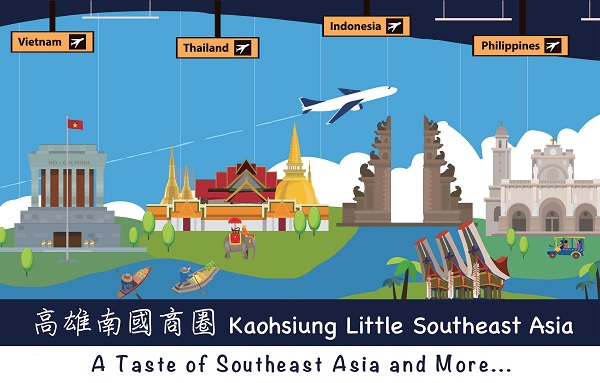
「偽出國」。
After leaving the majestic and novel train station in Kaohsiung, the port city of southern Taiwan, we passed a few streets and came to the intersection of Henan Road and Nanhua Road. Located on the corner of the Xingfu River, the "Southern Humanity Food Shop" has bright windows and bright wallpapers that exude Nanyang enthusiasm.
The advertising board on the outer wall of the triangular window store depicts the unique scenery of Indonesia, Thailand, Vietnam, and the Philippines. A map hangs on the beams of the arcade - Jianguo Road and Bade Road are the boundaries to the north and south, and Linsen Road and Nantai Road are the east and west boundaries. Between them, the "Kaohsiung Nanguo Business District" is designated, welcoming immigrants from Southeast Asia as if they have returned home; it also calls on locals to "fake going abroad" and experience the Southeast Asian style.
What kind of store is this? What other intentions does this business district have? How did it all start?
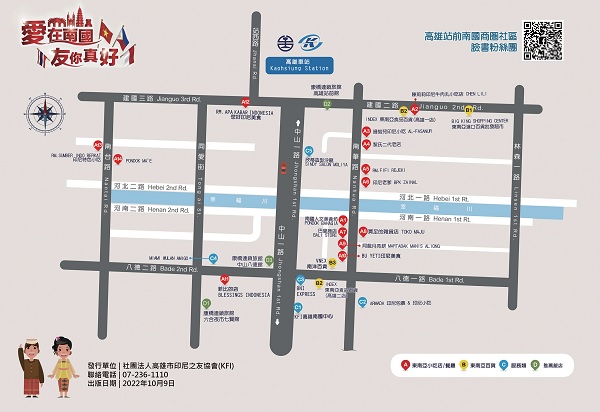
Saw the Indonesian sister living in the house
In 2012, Tsai Wei-hsin returned to Taiwan from the United States and settled down, serving as a volunteer at the Industrial Gospel Fellowship (hereinafter referred to as Gongfu) and the Joshua School of Management. In order to do his part in the areas of greater need in his hometown, he moved to Taiwan. After arriving in Kaohsiung, we first stayed at Holy Light Seminary, not far from the station.
Several snack shops and grocery stores around the Holy Light Campus had unfamiliar words on the signs. Along the sidewalk of the store, there is always a group of workers from Nanyang squatting, chatting and laughing, or eating lunch. In parks large and small in the city, there are always a few women with their heads covered, pushing wheelchairs and accompanying Taiwanese grandparents to bask in the sun.
Weixin learned about the needs of the migrant workers group from its visits to foreign migrant workers and new residents. However, when he shared it with You Peishan (hereinafter referred to as Susan), the deputy dean of Holy Light at the time, Susan, who had been at Holy Light for many years, said that she had seen everything but not seen it. Isn’t this the situation in Taiwanese society in general and even in the church?
When Weixin conducted further investigation, it was found that there were approximately 190,000 Indonesian migrant workers in Taiwan at that time, and the highest number so far is 270,000. At that time, there were already churches belonging to Thai and Filipino migrant workers, as well as ministries caring for Vietnamese migrant workers. However, these "Indonesian sisters", who are mostly home caretakers, take on the burden of caring for their elders on behalf of many Taiwanese families and contribute their mind, body and youth to the aging society. Have they ever received the caring attention of the public and the church?
However, how to contact and serve them? In addition to the language barrier, caregiving work is long-lasting and long-term. If they cannot come to church, is it possible for the church to go among them?
He expressed to Susan that he was willing to provide scholarships to Indonesian overseas students and hoped that they could help contact and care for migrant workers also from Indonesia. Unexpectedly, Xie Huichun, an overseas Chinese theological student, delayed his arrival at Holy Light to register and missed the fall internship arrangements. He was able to join this new service team at the beginning of the spring semester in 2013. The team also includes Liu Lizhi and Huang Meichun, a couple who are Holy Light vocational seminarians.
At first, they rented the space outside the karaoke room on the second floor of an Indonesian grocery store and set up a few tables so that Indonesian migrant workers who came to shop and sing karaoke could easily chat, learn Chinese, and play board games. However, factory workers who have regular vacation days come and go, making it difficult to build relationships. Weixin and his colleagues rethought their strategy and turned their attention once again to caregivers, who accounted for 80% of migrant workers.
The challenges of cross-cultural missionary work mostly lie in language and environmental adaptation. But this group of Indonesian sister caregivers who came to take care of Taiwanese grandparents have taken on these challenges - they live with Taiwanese families, can communicate in Chinese and Taiwanese, and have adapted to Taiwan's culture and environment.
Cai Weixin thought: It is rare for them to have a vacation, especially in southern Taiwan. How to contact them is indeed a challenge. Since they have crossed cultures and come to us, why don’t we “become flesh” and go among them? So he formed a team with co-workers from different churches and associations, including seminary student Xie Huichun, and walked out of the building and into the park, where the Indonesian sister would push her grandparents every day. During the weekly "kindness encounter" there, some members of the team cared about Taiwanese elders, while others talked with Indonesian sisters. Colleagues called it "matching care."
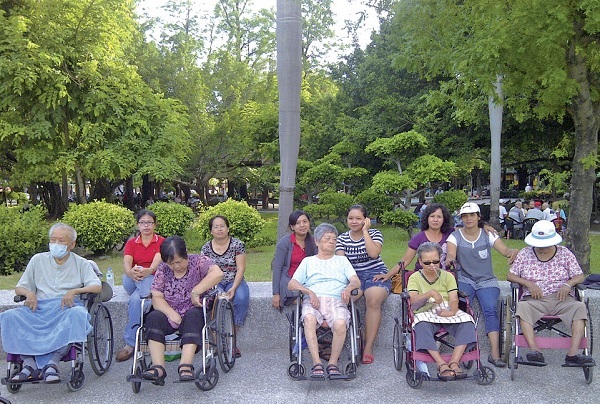
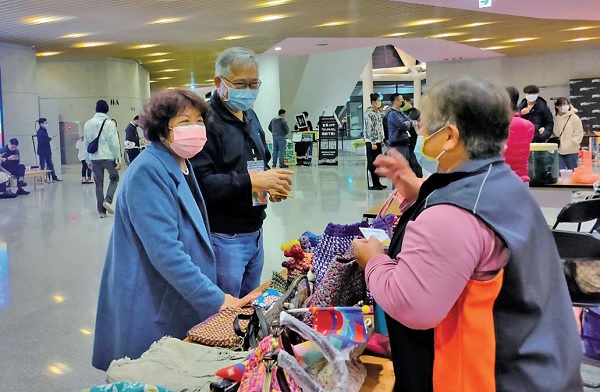
Give them the love they need
The team's principles are: respect their beliefs (mostly Muslims); not talk about Christianity in public; and do not want to hinder relationships because of religious language. Once a relationship is established, co-workers can observe opportunities wisely and keenly, and share their lives and life testimonies. What the Bible calls "faith, hope, and love", Weixin hopes to start practicing from "love" - making them feel heard, seen and respected, bringing them hope and becoming the starting point of faith.
From the conversation in the park, Weixin and Susan's team discovered that many Indonesian caregivers devote the best years of their lives to taking care of Taiwanese elders, but miss the growth of their own children, and there are also many cases where their marriages are in trouble. When they have to return to their hometown, they may only be left with a large empty house waiting for them; this is the asset they have earned by sending money home over the years, but they have no family to share it with.
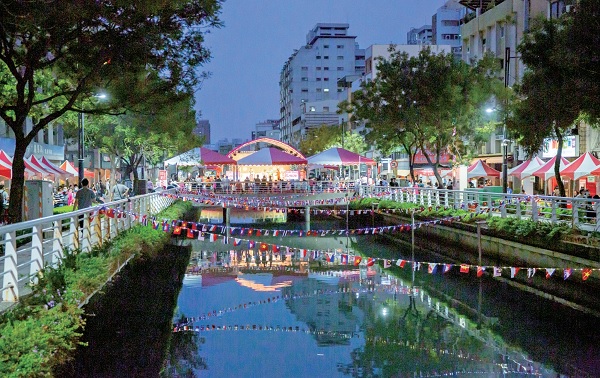
Cai Weixin started planning to teach the caregivers Chinese, English, baking, and computers. He hoped that with their skills, they would not need to stay in Taiwan for so long and could reunite with their families as soon as possible. They could also make a living in this way in the future and no longer have to leave their hometown. .
In 2014, Kaohsiung Friends of Indonesia (KFI) was established, with Cai Weixin as the chairman and ministry partner Susan as the secretary-general. In 2017, we began to distinguish an NGO (Non-governmental Organization, non-governmental organization) aspect.
When the office was opened, senior representatives from two bureaus of the Kaohsiung City Government, five universities in the south, and one higher vocational school were invited to participate, as well as district chiefs, district chiefs, private partners, and representatives from church groups. Now this partnership has even expanded to eight universities’ University Social Responsibility Program partners, becoming a platform for university resources and immigrants’ needs to meet.
KFI is closely connected with the community. In 2020, KFI Nanguo Center was established. Universities and churches provide teachers for technical classes, also offer supplementary classes, and organize scattered Southeast Asian stores. The targets of contact have also expanded from migrant workers to new residents (commonly known as "foreign brides" or "foreign spouses"), and the new second generation (one parent is from Southeast Asia, which used to be called "sons of new Taiwan" or "children of foreign spouses") . And the park’s care for the Indonesian caregivers has not stopped. Cai Weixin and the KFI team operate seriously and have established credibility among Indonesian migrant workers in the past ten years. It seems that anyone who has anything to do with Indonesia will come to them.
Late one night, Weixin's cell phone rang. It was a call from the hospital. Adi (pseudonym), an Indonesian nurse who had only been in Taiwan for a month, was hospitalized due to acute appendicitis. The hospital asked her to sign a consent form for the surgery, but the language barrier made her refuse to sign out of fear. The medical staff didn't know where they found out about KFI and wanted to ask a teacher who knew Indonesian to help translate. Weixin and his co-workers went there immediately. After a clear explanation, they successfully obtained the signature and performed the operation. The day after the operation, when the co-workers went to visit her, they led the frightened Indonesian sister in a prayer of determination. Examples like this happen many times in teams.
Live among the southerners
The large and small stores in the business district used to work in their own way and only sold to "their own people." As a result, the stores with limited customer sources had a very tense relationship with each other due to fierce competition. The Kaohsiung Station reconstruction project is expected to be completed in 2027. After that, the surrounding business districts will continue to develop, and rents will only get higher and higher. How can these Indonesian and Vietnamese snack bars and grocery stores survive?
Tsai Weixin discussed with the store owners and encouraged them to look further and make the pie bigger: expand the customer base, attract local Hong Kong people who are accustomed to international culture, and also attract nearby cities who come to Kaohsiung for "tourism" due to the convenient MRT and light rail. When residents enter these businesses, they can "travel to Southeast Asia in a second" and experience the customs of a different place without leaving the country.
In 2018, KFI combined and coordinated with stores in the business district to hold activities with the theme of Southern China, each with its own flagship project. After this experience, the relationship between the bosses improved, and they began to have a sense of "community". They were no longer competitors, but partners working together for common prosperity. KFI's belief is to establish good and solid relationships with stores, because the bosses are not only businessmen, but also opinion leaders of the migrant workers group, through whom they can contact and influence customers.
In 2022, the "Triangular Window" store located in the heart of the business district at the intersection of Henan Road and Nanhua Road became vacant. Cai Weixin and Susan thought about it again and again: This is the facade of the Nanguo business district, and it is the most eye-catching prime location where the flow of people intersects. It would be a pity to visit an unrelated store with a signboard that is completely different from Southeast Asian culture! Besides, they have been running a community for many years, and it’s time to truly “live among them.”
The pair of ministry partners painted a scene - looking in through the large glass window, the Indonesian sister wearing a headscarf, the black-haired Taiwanese, the brown-haired and blond foreign tourists, separated by Filipino cakes and Malaysian cakes Various snacks such as coconut sugar jelly, Indonesian moon cakes, etc., and a pot of fruit tea, talking about life and life with laughter.
In October, the wholly-owned Nanguo Humanity Food Shop opened. On the opening day, there were only nine tables inside and outside, and it received about four to five hundred visitors; during the two months of trial operation, it also received guests from more than a dozen countries. After that, Weixin was responsible for welcoming the guests, and Susan stood behind the bar to eat. From time to time, she could see new residents and locals dining at the same table, or hear soft laughter, or see them holding hands and bearing the pain of life together with sparkling tears. heavy picture.
A company once reserved a venue for employee training, and the contact person first came to drink coffee and explore the way. Unexpectedly, we had a great conversation and agreed with the southern concept. Now I have signed up to become a baking teacher in the technical class, and the guests have become co-workers.
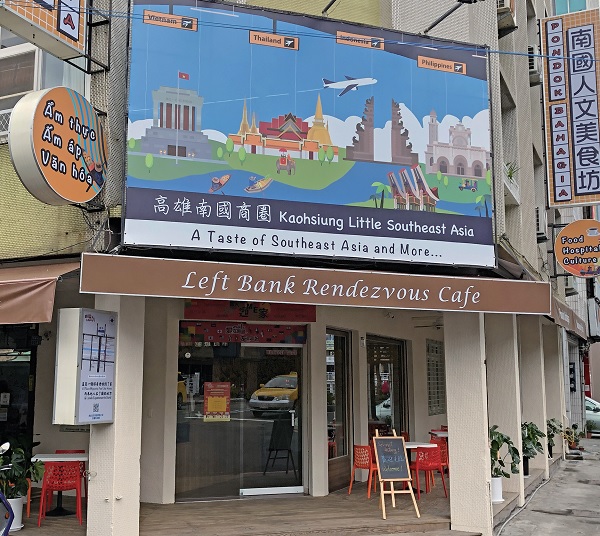
The Nanguo Humanity Food Court is the face of the business district, and the intersection of people's movement lines also allows KFI to live among immigrants.
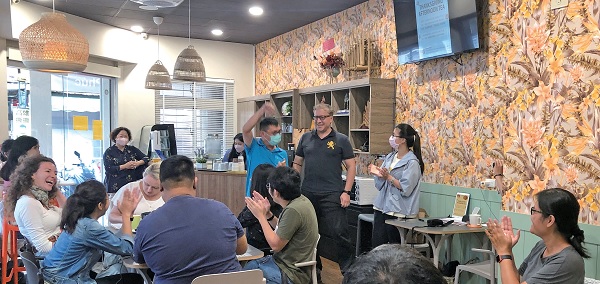
Immigrants become neighbors
By investing resources in this group of migrant workers and new residents, how many people have been brought to believe in the Lord? What do you hope to get in return?
For Cai Weixin, caring for and supporting the disadvantaged is a belief deeply rooted in his genes and an inevitable mission. My mother has been the principal of Shuanglian Kindergarten in Taipei for many years. In an era when society still excluded people with disabilities, she pioneered early childhood education for children with severe intellectual disabilities. My father also used half of his pension to support this ministry. The Taichung Gethsemane Missionary Church, led by my cousin Pastor Lin Shuzhen, has been caring for migrant workers and foreign spouses from Vietnam since the late 1990s (see issue 30 of this magazine "The Pearl of the South China Sea at a Price - Caring for Taiwanese Foreign Spouses") .
Another major influence came from Weixin's late wife Li Xiaomi (she was taken back to Tianjia due to cancer in 2009). Helping the needy and suffering people has been their wish for many years. Before returning to Taiwan to start serving, he went to the International Development Program at Fuller Theological Seminary to receive equipment related to poverty alleviation ministry.
Since the late 1980s, Taiwan has introduced workers from Southeast Asia, and together with their spouses from Southeast Asia, they have been called "foreign workers," "Filipino workers," "Filipino domestic helpers," "foreign brides," and "foreign spouses." These "outsiders" provide Taiwan with a labor force of nearly 6% (statistics in 2020) and nurture the next generation. No matter how long they stay here, they have become part of society.
They are "immigrants"—They moved their residence from their hometown to Taiwan; they are the "neighbors" of the Taiwanese people.
Xiaotai (pseudonym) has a somewhat complicated family background; he calls the person in the family who looks like his father "brother." His younger brother came to KFI's remedial class and liked it very much, so he invited his brother and sister to join him. At that time, Xiaotai had dropped out of high school for a year. Not only was he not interested in studying, he also disliked everyone and everything around him with anger. The eldest sister from Wenzao Foreign Languages University kindly taught Xiaotai that Xiaotai changed and felt that studying was not so boring, so he resumed school after one semester.
My father, who runs a snack bar, was pleasantly surprised and began to visit KFI frequently and learned how to keep the store tidy. The changes in his store also led to renovation and cleaning of nearby businesses. Gradually, the stores in the business district took on a completely new look. In September 2022, KFI even mentored these stores, and together with new residents and university leaders in the area, established a business district development promotion association, which also began to gain recognition and recognition from mainstream society.
For Weixin, Susan, and all members of the team, the abbreviation of the organization's name, KFI, now stands for Kindness, Friendship, and Impact; treating people with kindness, building friendships, and making an impact.
This influence even extends to Indonesia. Indonesian Muslims account for about 86% of the total population, and there is a considerable gap between them and the Chinese community. Chinese Christians are even more negatively labeled. In 2016, political figure Ahok was imprisoned on charges of blasphemy after his words were edited and distorted. This is a famous example. Therefore, what Weixin hopes to see even more is that these Indonesian sisters, who have had negative impressions of Chinese and Christians since childhood, can bring the care they have received from Taiwanese Christians back to their hometowns. Once more ambitious elements stir up anti-Chinese or anti-Christian turmoil, they can remember and convey the kindness and respect they received, and become a force of stability and peace in their villages, cities and countryside.
Cross-cultural missionary zero distance
The faith entered Taiwan because of the cross-cultural missionary work of James Ma, Jack Ma, and others. Taiwan now has approximately 700,000 migrant workers, more than 500,000 new residents, and more than 100,000 foreign students. Aren’t they the target of Christian cross-cultural missionary work? Especially in Indonesia, which has the largest Muslim population in the world, one-thousandth of its population works in Taiwan, and most of them live in the homes of their employers, and even live with Christian families to take care of their elders.
This is already their home.
The gospel is not only passed down orally, but also reveals kindness and respect for every life in daily life. When God brings "Samaria" and "the ends of the earth" to our doorsteps, or even inside our homes, isn't it for every disciple to have the opportunity to participate in zero-distance cross-cultural missions?
To learn more about or participate in KFI,Please email sahabatkhh@gmail.com.
 Interviewee
Interviewee
You Peishan(Susan Yu), currently the chairman of the Indonesian Friends Association of Kaohsiung City. He once served as Vice President of Kaohsiung Holy Light Theological Seminary; Chairman of the Kaohsiung City Pastors and Workers United Prayer Association; Missionary Fundraising Coordinator of the World Mission Department of the North American General Conference of the Methodist Church; Supervisory Administrative Assistant of the West Coast Conference of the Methodist Church; Missions of the West Coast Conference of the Methodist Church Department Chairman.

Cai Weixin, currently the CEO of Kaohsiung City Indonesia Friends Association. Ph.D. in Physics from the United States. He has worked at Bell Labs and as General Manager of Asia Operations for a listed optical communications company in the United States. He is the inventor of 14 U.S. patents. In 2012, he returned to Taiwan to serve as a workplace coach and volunteer to care for the disadvantaged. In 2013, he began serving Indonesian migrant workers and mobilized churches in Indonesia and Taiwan to engage in two-way missionary work.

